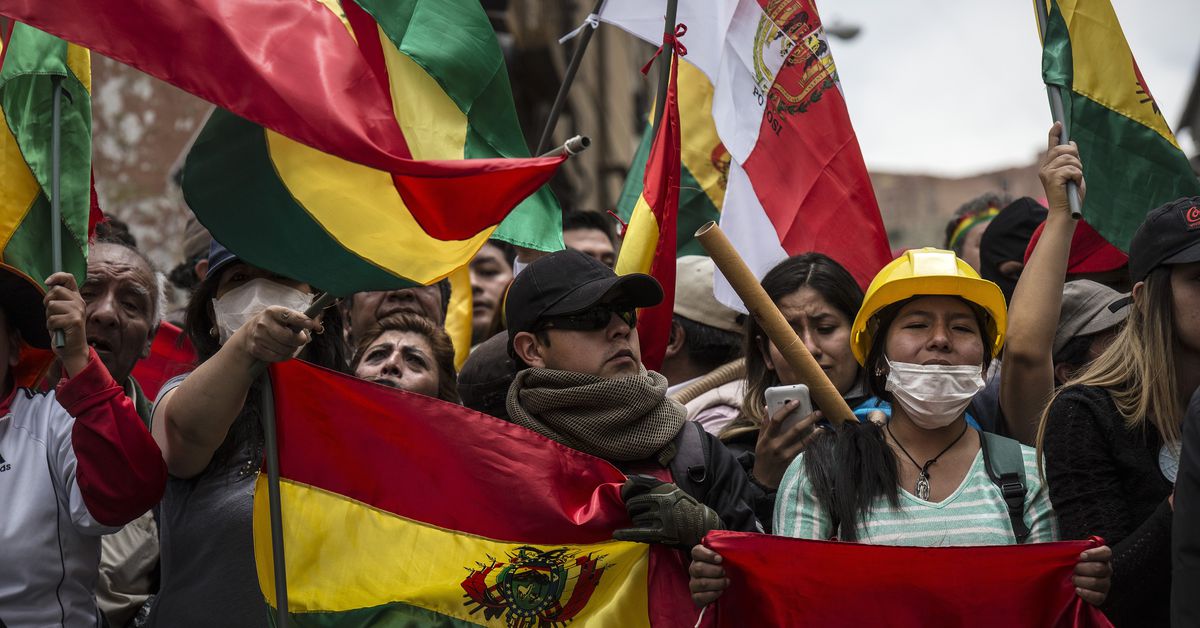
Since last week, a network of Twitter bot accounts has been spreading confusion about the events surrounding Bolivian President Evo Morales’ abrupt resignation. The messages, which appear in English and Spanish, all carry the exact same text, beginning with the words, “Friends from everywhere, in Bolivia there was no coup.”
Initial iterations of the tweet seem to have been written by an authentic critic of Morales, but the sentiment was co-opted and amplified by what experts say is a network of automated Twitter accounts. Although Twitter has removed many of the tweets, there are 4,320 still on the network as of press time.
The news comes as legitimate confusion about the events surrounding Morales’ resignation continues to circulate online. On November 11th, 2019, Morales resigned amid nationwide protests over his highly contested reelection. The populist president had been trying to seek a fourth term — a move seen by many as unconstitutional. When the initial vote count came in, the race was close enough to go to a runoff, which cast doubt on Morales’ subsequent landslide victory.
The Organization of American States, a coalition based in Washington, DC, audited the election and voiced “deep concern and surprise at the drastic and hard-to-explain change in the trend of the preliminary results revealed after the closing of the polls,” as reported by The Intercept. The dispute set the stage for weeks of protests that ultimately resulted in the military calling for Morales to step down, which he eventually did. However, the military’s involvement has led many to see the transfer of power as fundamentally undemocratic and describe it as a coup.
On November 10th at 6:27PM, a Bolivian college student posted the original version of the message on Facebook. “Friends from everywhere, in Bolivia there was no coup,” she wrote in English. “There was a peaceful movement of the Bolivian people to recover the respect to our vote, democracy and our constitution.” Her account appears to be real, and the message seems to have been posted in earnest. The student didn’t ask others to help spread the message, but people began posting a shortened version on their own profiles.
When the message spread from Facebook to Twitter, however, activity started to shift from real people concerned with the Bolivian uprising to bots looking to capitalize on the confusion. Many of the automated tweets were directed at verified users, including Rigoberta Menchú and Greta Thunberg, to make the activity less suspicious.
Experts say the pattern of at-tweeting is a common indication of inauthentic activity. “The way 90% of bot farms are built today is they look for verified accounts (blue checkmarks) to follow so they can trick Facebook/ Twitter into thinking they are legitimate accounts before they start interacting with other accounts,” explained Dovetale founder Michael Schmidt, who studies inauthentic activity on social media.
Misinformation researcher Renée DiResta is hesitant about assuming these types of campaigns are automated since it can overshadow real people’s efforts to spread awareness. “Engaging supporters to repost a message is a tactic that many real, legitimate activists use,” she said. “Dismissing real moments out-of-hand as bot activity solely based on the content of the message would be jumping to conclusions.”
But there are good reasons to believe this campaign was promoted by bots, at least on Twitter. Schmidt helped The Verge track down the origins of the movement and said the number of people posting the message, and the types of accounts that picked it up, leave little doubt that it was an automated effort. “My guess is that they used the polarizing events of the election to cause hysteria by pumping this post via a bot network. That is 100% true. This is a bot network. No doubt,” he said. “The real question is who is behind it.”
That question is harder to answer. Last week, when the hashtag began trending in Virginia, home of the CIA, some people argued that the US government was behind the campaign, although the state has a large Bolivian population and it’s possible the hashtag went viral organically. Donald Trump had already called Morales’ resignation a “significant moment for democracy,” as reported by The Hill, which lent the theory credibility.
But Schmidt said governments aren’t the only organizations with an interest in stirring up unrest. “The culprit could be Russia, the USA or even a kid in his bedroom that just wants to stir the pot,” he added.
Ultimately, whether Morales’ resignation was the sign of a democratic uprising or a military coup isn’t the point of the campaign, Schmidt explained. “At the end of the day, what matters is the public’s perception. The data is clearly polarizing and that is clearly the end goal here.”
This article has been corrected to reflect that the initial vote count was close enough to go to a runoff.
https://www.theverge.com/2019/11/18/20970888/bot-campaign-twitter-facebook-bolivia-uprising-coup-confusion

